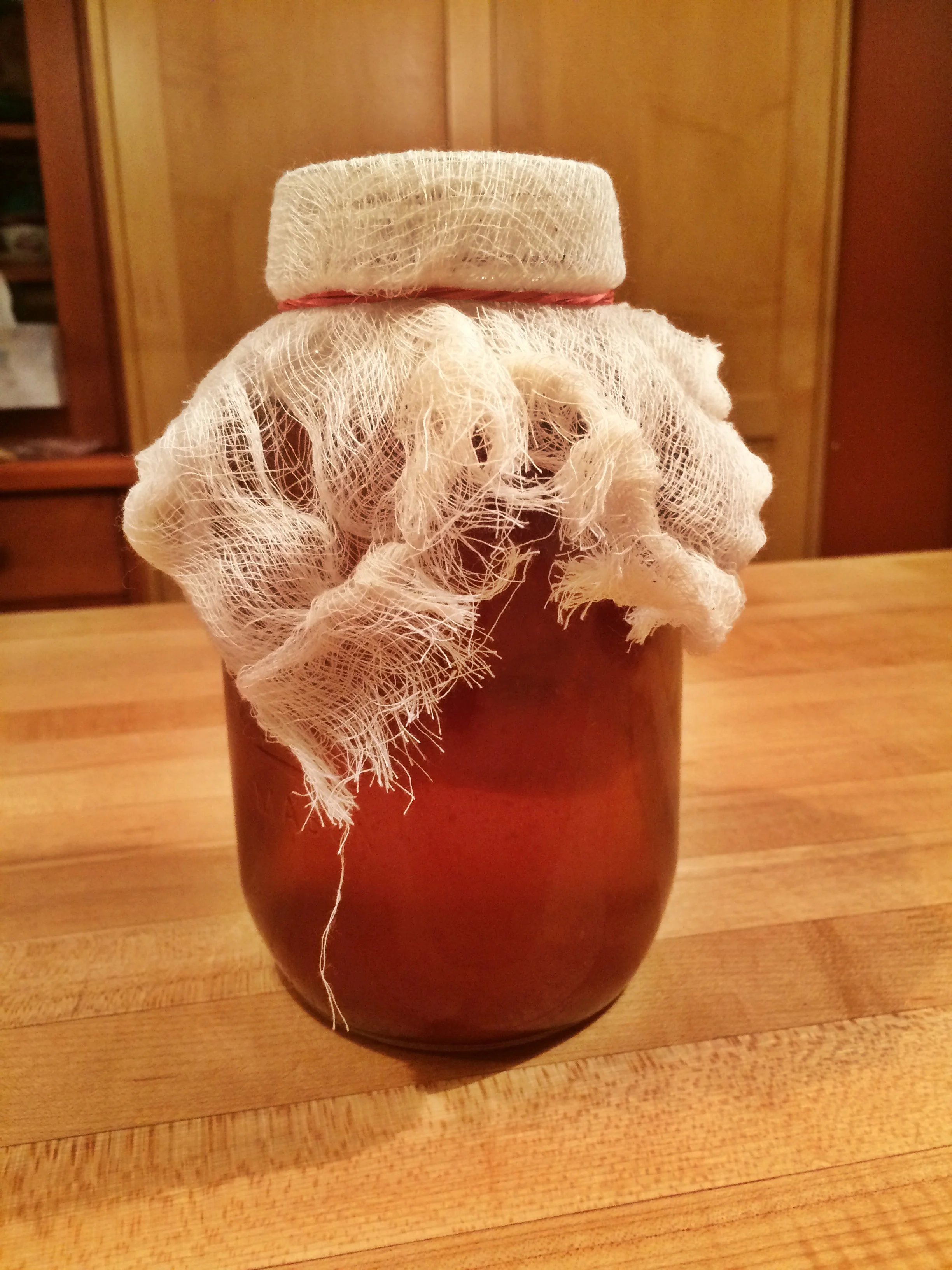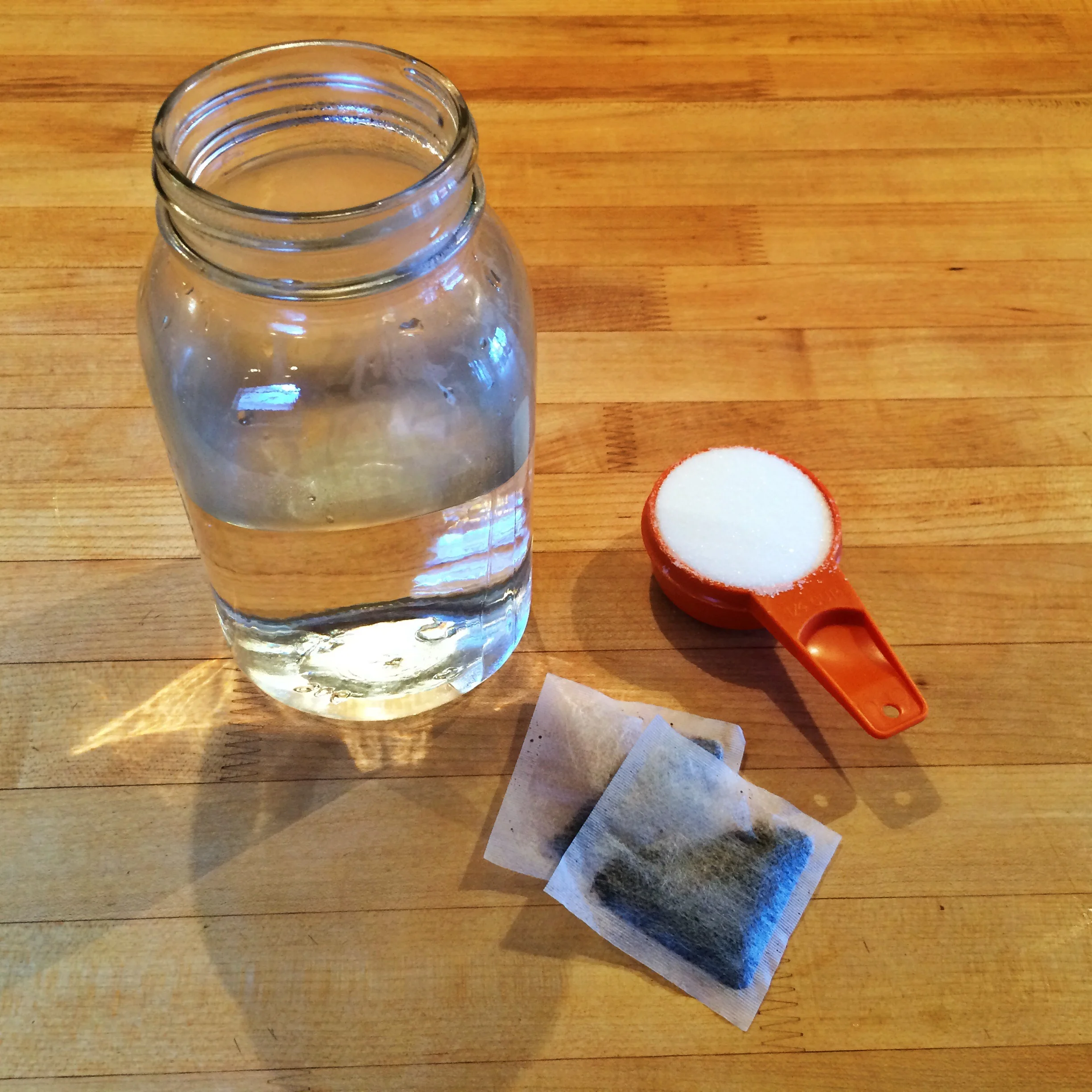My Basic Kombucha Recipe
Kombucha is a fizzy fermented drink that is a less sweet alternative to pop or juice. As it is fermented, it contains the added benefit of probiotics to support a healthy gut microbiome. Making kombucha is fun and easy, once you get into the rhythm of it. The basic idea is to mix tea, sugar, and a starter bacterial culture, called the "mother" or "scoby", and let it sit for about a week so the fermentation magic can happen. You then remove the scoby and add other flavourings you might like, let it sit for a few more days, and voila!
Recipe:
1 scoby and about 1 cup of starter liquid (i.e. kombucha from previous batch)
2 bags of black or green tea
1/3 cup sugar
1 clean mason jar (or other glass jar, not plastic or metal)
Instructions:
1. Add boiling water to mason jar with tea bags and sugar. Leave enough space at the top to add your scoby and starter liquid later on. Stir to dissolve sugar and let sit until completely cooled.
3. Add scoby and starter liquid. The scoby may float on top or may sink, either way is just fine. Over time, it will start to grow a layer that perfectly fits the top surface of the liquid in your container. Cover with a piece of cloth, and secure with elastic or string. This allows the mixture to be open to the air but protected from dust. Store in a cool place out of direct sunlight. I usually leave my kombucha at the back of the counter in my kitchen so I don't forget about it.
4. Check the flavour every few days. Over time the kombucha will become less sweet and more tart. It will probably take 7-8 days to ferment (this varies with temperature). You can decide when the flavour suits you. If you let it go too long though it will become vinegary and unpleasant, in which case you can just start again from step 1.
5. When you are happy with the sweetness level, use a spoon or tongs to remove your scoby, and pour out a little bit of starter liquid for your next batch. At this point you can add any flavourings you might like. This is your opportunity to get creative! I will post more recipes in the future with some of my favourite flavour combinations, but for now some suggestions include sliced ginger root, or a handful of frozen blueberries, or a bit of fruit juice. Or you can add nothing at all.
6. Cover the mason jar with a metal screw-top lid. Let sit for about 2 days to allow the kombucha to become carbonated. Caution though - don't forget about it at this stage because if the pressure builds up it may explode (it will take quite a long time to get to this, but it is possible, I speak from experience). Don't open it too frequently, because every time you check it you release the pressure. Once you are satisfied with the carbonation, strain the liquid through a sieve and store your kombucha in the refrigerator to slow down further fermentation.
7. Drink and enjoy! Repeat the process from the beginning to make another batch. You may find as your drink your kombucha that after a few days it starts to grow a new thin scoby film along the top - this is not a concern, just fish it out and compost it.
More about your "scoby", and how to source one: Admittedly, a scoby looks a little gross. It is actually an acronym standing for Symbiotic Culture Of Bacteria and Yeast. Like any healthy ferment, let your nose be your guide - if it starts to turn black or smell off, it probably is. If it gets a little brown or starts to bubble, that's normal. Over time your scoby will grow and reproduce multiple layers, and you can give these away to friends so they can start their own kombucha. If you don't have a scoby, try looking on craigslist or kijiji. People often post there willing to give one away for free, or perhaps sell it for a small fee. If you want to take a break from making kombucha for a while, you can make a batch with plenty of tea and sugar, and store it in the fridge, where it will ferment much more slowly and live happily for quite a long time.
Varying the sugar and tea types: The scoby lives off sugar and caffeine, so while it is happy with black and green tea (or white, oolong, ect), it will not like herbal tea alone (though perhaps a blend would be tasty). Avoid teas that contain oils (such as earl grey). I have experimented with various types of sugar, and I prefer cane sugar. Although I think it is ideal to use organic unrefined cane sugar, considering that the scoby eats most of the sugar I prefer to save the more expensive sugars to eat myself. Do not use honey because it has antimicrobial properties that will not be conducive to a happy and healthy scoby.
A couple other important notes: Kombucha does have a small alcohol content. This is not enough that you are likely to feel it, nor will it interfere with your driving or fine motor skills, but may be a concern for anyone with a history of alcoholism or other reason to avoid alcohol. Drinking large amounts of kombucha (how large depends on the person) can cause an upset stomach. Everything in moderation.
Health benefits: A quick google search tells me that kombucha can benefit cancer, arthritis, boost your immune system, resolve your digestive issues, help your liver detox your body, and probably find you your perfect job, soul-mate, and a multi-million dollar mansion too... On the other hand, a quick pub med search tells me that kombucha does have antioxidant properties, it does a bunch of stuff to rats in labs, and there is a reported case of hepato-toxicity in an HIV positive man (although it has also been shown to be hepatoprotective in rats). Kombucha and other fermented drinks have a LONG history if traditional use , but as with many hyped-up alternative health trends, the research jury is still out as to its health benefits.
I'll tell you what makes sense to me. Kombucha tastes good. It is a less sugary alternative to drinking pop or other sweet beverages, and while sugar in moderation is fine, the amount of sugar consumed in the "standard American diet" is excessive and reducing it is a good thing. Green tea contains antioxidants and EGCG (epigallocatechin gallate), which consumed in large quantities is shown to have benefit against some types of cancers, as well as to be helpful in preventing cardiovascular disease. However you probably won't get enough of this from kombucha alone to make a huge difference. Kombucha contains probiotics and supports a healthy microbiome (as I wrote more about here), which is good for your immune system and overall health. The fermentation process ups the B vitamin content, and B vitamins are essential cofactors for many many reactions in your body cells. Any added herbs or flavourings you mix in will have their own medicinal properties (ex. ginger root). All in all, not a miracle drink, but a good healthy tonic that is a tasty additional to a comprehensive healthy diet.
Please feel free to let me know if you have any troubleshooting questions or concerns in making your own kombucha. I'm happy to answer. Also, if you're in the Vancouver area, let me know if you want a scoby!
Further reading:
The best review I was able to find on kombucha research is here. For more on the benefits of green tea, see here.
Disclaimer: Information can be empowering, but we all have unique health profiles and needs. Health-related information contained in this post is intended to be general in nature and should not be used as a substitute for a visit with a Naturopathic or other doctor. The advice is intended to offer only a general basis for individuals to discuss their medical condition with their health care provider.


